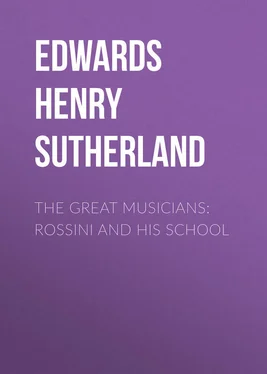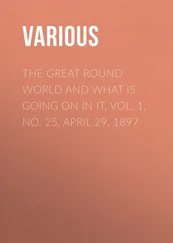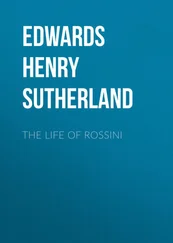Henry Edwards - The Great Musicians - Rossini and His School
Здесь есть возможность читать онлайн «Henry Edwards - The Great Musicians - Rossini and His School» — ознакомительный отрывок электронной книги совершенно бесплатно, а после прочтения отрывка купить полную версию. В некоторых случаях можно слушать аудио, скачать через торрент в формате fb2 и присутствует краткое содержание. Жанр: foreign_antique, foreign_prose, на английском языке. Описание произведения, (предисловие) а так же отзывы посетителей доступны на портале библиотеки ЛибКат.
- Название:The Great Musicians: Rossini and His School
- Автор:
- Жанр:
- Год:неизвестен
- ISBN:нет данных
- Рейтинг книги:5 / 5. Голосов: 1
-
Избранное:Добавить в избранное
- Отзывы:
-
Ваша оценка:
- 100
- 1
- 2
- 3
- 4
- 5
The Great Musicians: Rossini and His School: краткое содержание, описание и аннотация
Предлагаем к чтению аннотацию, описание, краткое содержание или предисловие (зависит от того, что написал сам автор книги «The Great Musicians: Rossini and His School»). Если вы не нашли необходимую информацию о книге — напишите в комментариях, мы постараемся отыскать её.
The Great Musicians: Rossini and His School — читать онлайн ознакомительный отрывок
Ниже представлен текст книги, разбитый по страницам. Система сохранения места последней прочитанной страницы, позволяет с удобством читать онлайн бесплатно книгу «The Great Musicians: Rossini and His School», без необходимости каждый раз заново искать на чём Вы остановились. Поставьте закладку, и сможете в любой момент перейти на страницу, на которой закончили чтение.
Интервал:
Закладка:
CHAPTER II.
LA PIETRA DEL PARAGONE
ROSSINI had already written two operas in 1812, and he was destined in this fertile year to produce three more: two at Venice, La Scala di Seta and L'Occasione fa il Ladro ; and one at Milan, La Pietra del Paragone .
La Pietra del Paragone was Rossini's next great success after L'Inganno Felice . The leading parts were assigned to Galli, afterwards one of the most famous bass-singers of his time, and to Madame Marcolini, who had played the principal character in L'Equivoco Stravagante , and who had particularly distinguished herself in that work by her singing of the final rondo before mentioned.
In La Pietra del Paragone Madame Marcolini was furnished with a final rondo of the pattern already approved, and in this, as in the earlier one, she gained a most brilliant success.
The libretto of La Pietra del Paragone is founded on an idea at least as old as that of Timon of Athens . Count Asdrubal, surrounded by friends and beloved by a charming young lady, is rash enough to wish to know whether the friendship and the love he seems to have inspired are due to himself and his own personal qualities, or to the riches he is known to possess. To determine the point he causes a bill of exchange for a large sum to be presented at his house. He himself appears in disguise to claim the money; and, in accordance with instructions given beforehand, the count's steward recognises the signature and honours the draft. The sum for which the bill has been made out is so large that to pay it the count's exchequer is absolutely drained. Some few of the friends stand the test well enough, but others, as might have been expected, prove insincere. As for the young lady, the "touchstone" has the effect of bringing out her character in the brightest colours. Timid by nature, she had hitherto refrained from expressing, except in the most reserved manner, the love she really entertains for Count Asdrubal. After his apparent ruin, however, the advances are all from her side; and she finds herself obliged to resort to all kinds of devices in order to compel him to a formal declaration. She even feels called upon to appear – though whether for logical or merely for picturesque reasons can scarcely at this distant date be decided – in a Hussar uniform; and in this striking garb Madame Marcolini sang the celebrated final rondo, saluting the public with her sabre in acknowledgment of their applause, and repeating the salutes again and again as the applause was renewed.
La Pietra del Paragone is quite unknown to the opera-goers of the present day. It belongs to the year 1812, and probably no one now living ever heard it. Many, however, have heard portions of it; for La Pietra del Paragone not having proved thoroughly successful as a whole, the composer extracted the best pieces from it and introduced them into La Cenerentola , which, five years later, was represented for the first time at Rome. The air "Miei rampolli," the duet "Un soave no so chè," the drinking chorus, and the baron's burlesque proclamation, were all borrowed or rather taken once and for ever from the score of La Pietra del Paragone . Some other pieces, too, from the same work were nearly fifty years later heard at least once in an opera attributed to Rossini brought out at Paris in the year 1859. It has been said that among Rossini's operas of the year 1812 were two written for the San Mosè of Venice. The second of these, L'Occasione fa il Ladro , made its appearance substantially at Naples in conjunction with the pieces just spoken of, extracted from La Pietra del Paragone . An Italian poetaster, Signor Berettoni, gave to his new arrangement of L'Occasione fa il Ladro (which, by the way, he had enriched with selections not only from La Pietra del Paragone , but also from Aureliano in Palmira ) the title of Un Curioso Accidente .
Rossini, however, though he did not mind borrowing from himself, did not choose to be borrowed from without permission, as without dexterity, by other persons; and finding that a pasticcio made up of pieces taken more or less at random from the works of his youth was to be brought out as a new and original work, he addressed to the manager of the Théâtre des Italiens, M. Calzado, the following letter on the subject: —
"November 11th, 1859.."SIR, – I am told that the bills of your theatre announce a new opera by me under this title Un Curioso Accidente .
"I do not know whether I have the right to prevent the representation of a production in two acts (more or less) made up of old pieces of mine; I have never occupied myself with questions of this kind in regard to my works (not one of which, by the way, is named Un Curioso Accidente ). In any case I have not objected to, and I do not object to, the representation of Un Curioso Accidente . But I cannot allow the public invited to your theatre, and your subscribers to think either that it is a new opera by me or that I took any part in arranging it.
"I must beg of you then to remove from your bills the word new , together with my name as author, and to substitute instead the following: – 'Opera, consisting of pieces by M. Rossini, arranged by M. Berettoni.'
"I request that this alteration may appear in the bills of to-morrow, in default of which I shall be obliged to ask from justice what I now ask from your good faith.
"Accept my sincere compliments, (Signed) "GIOACHINO ROSSINI."On receiving this letter the manager withdrew the well-named Curioso Accidente , in connection with which no accident was more curious than that of its production. It had already been played once; and at this single representation much success had been obtained by a trio in the buffo style for men's voices borrowed from La Pietra del Paragone , and a duet for soprano and contralto from Aureliano in Palmira .
It is not so easy as it may at first appear to decide which deserves to be considered the first of Rossini's operas. The opera or operetta of La Cambiale di Matrimonio (1810), was the first produced on the stage; and L'Inganno Felice (1812), was the first which made a marked impression, and which, played throughout Italy, at Paris, and at Vienna, gained for its author something like a European reputation. But the first opera that Rossini ever composed was Demetrio e Polibio , which, written in the spring of 1809 when he was just seventeen years old, was produced at Rome – though not until it had undergone a process of retouching – in 1812.
An Italian officer, whom Stendhal met at Como one night when Demetrio e Polibio was to be represented – or perhaps it was the Abbé Carpani who met him; in any case the story is to be found in Stendhal's Life of Rossini – gave this curious account of the Mombelli family, all of whom were connected in one way or another with the performance of Rossini's earliest opera.
"The Mombellis Company," he said, "consists of a single family. Of the two daughters, one, who is always dressed as a man, takes the part of the musico (or sopranist); that is Marianna. The other one, Esther, who has a voice of greater extent though less even, less perfectly sweet, is the prima donna. In Demetrio e Polibio the old Mombelli, who was once a celebrated tenor takes the part of the King. That of the chief of the conspirators will be filled by a person called Olivieri, who has long been attached to Madame Mombelli, the mother, and who, to be useful to the family, takes utility parts on the stage and acts in the house as cook and major domo. Without being pretty, the Mombellis have pleasing faces. But they are ferociously virtuous, and it is supposed that the father, who is an ambitious man, wishes to get them married."
Читать дальшеИнтервал:
Закладка:
Похожие книги на «The Great Musicians: Rossini and His School»
Представляем Вашему вниманию похожие книги на «The Great Musicians: Rossini and His School» списком для выбора. Мы отобрали схожую по названию и смыслу литературу в надежде предоставить читателям больше вариантов отыскать новые, интересные, ещё непрочитанные произведения.
Обсуждение, отзывы о книге «The Great Musicians: Rossini and His School» и просто собственные мнения читателей. Оставьте ваши комментарии, напишите, что Вы думаете о произведении, его смысле или главных героях. Укажите что конкретно понравилось, а что нет, и почему Вы так считаете.












